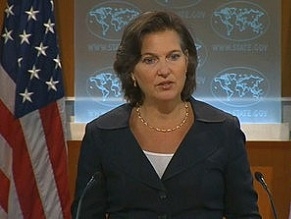|
World Jewish News

US State Department spokeswoman Victoria Nuland insisted America’s relations with a future Palestinian government featuring Hamas “will be very difficult if they do not do what is necessary, including recognising Israel, renouncing violence, and all of th
|
US expresses concerns about Hamas inclusion in next Palestinian government should the terrorist group fail to recognise Israel
18.02.2013, Israel and the World The US expressed its concern about the likely inclusion of internationally outlawed group Hamas in the next Palestinian government, after Palestinian Authority (PA) President Mahmoud Abbas told a meeting of newly-elected mayors and senior PA officials last week that “an agreement has been reached with Hamas that we form a unity government to be headed by me”.
The Gaza leaders, designated a terrorist group by the US, the EU and Israel, however disagree with rival faction Fatah under Abbas’ leadership over the optimum timing for elections, the President conceded, after the Palestinian electoral commission last week began updating voter registration lists in the West Bank and Gaza scheduled for completion Monday and following which point Palestinian law dictates elections should be held within three months.
Responding to his comments Friday at a State Department press briefing, spokesman Victoria Nuland insisted America’s relations with a future Palestinian government featuring Hamas “will be very difficult if they do not do what is necessary, including recognising Israel, renouncing violence, and all of those things that we regularly state”.
The EU by contrast has been a vocal advocate of intra-Palestinian reconciliation in light of last November’s Egypt-brokered Gaza ceasefire as Egypt continues to seek to take a similarly prominent role in reunited Hamas with Fatah, having been estranged since Hamas seized control of Gaza from its rivals in a coup in 2007.
Despite reports of Bulgaria expelling a Hamas delegation they had previously invited last week in the aftermath of its report on last July’s Burgas bombing of Israeli tourist, which fingered Lebanese Hezbollah as the perpetrators, with a European Parliament plenary session in December concluding that continued to Israel’s security came from intra-Palestinian divisions, which it claimed further endangers Gaza’s future “as long it remains politically and economically separated from the West Bank”, under the control of the internationally-recognised PA.
US Secretary of State John Kerry conducted phone calls with both Abbas and Israeli Premier Benjamin Netanyahu shortly after assuming office earlier this month, in a move designed to demonstrate his “personal commitment as well as our national commitment and the President’s commitment t helping the Israelis and Palestinians get back to the table, to supporting the peace process”. President Barack Obama as well as Kerry have both announced imminent state visits to Israel to further consolidate this commitment.
Elsewhere at the start of the weekly cabinet meeting Sunday, Netanyahu reiterated his hopes of forming the broadest based possible coalition of Israeli political factions following last month’s national elections with the hopes of “moving forward on the diplomatic process with the Palestinians”, a topic he designated as a key focal point for Obama’s visit beginning March 20.
by: Shari Ryness
EJP
|
|
